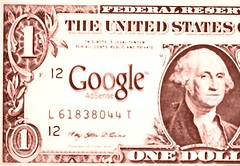 |
| Picture: Peter Forret |
Google has made other big purchases - including a stake in AOL from Time Warner at $1bn for 5% [source]. But I guess this one has all the romance of another dot com fairytale.
Speaking of fairytales, is Google too good to be true?
Google’s market capitalization at $110 billion is larger than Coca-Cola’s $98 billion and over twice Yahoo’s $46 billion [source].
If Google were an established business, one branch of theory would expect it to return earnings equal to its weighted averaged cost of capital (WACC) - basically the average of what shareholders and creditors expect back on their funds invested/lent to Google. Using the Capital Asset Pricing Model, Google's WACC could be estimated at 14,7% [source]. That would imply (based on Google's market value of $110bn) that Google would have to return $16,17bn per annum in earnings.
Google earned $6,139bn in revenues and $1,465bn in earnings for the financial year ending in December 2005 [source].
For 2006, Bear Stearns raised its revenue estimate to $6,8 billion from $6,55 billion. For 2007, Bear raised its revenue estimate to $10,1 billion from $8,3 billion (in April 2006 - prior to the YouTube acquisition) [source].
This after the 2005 earnings disappointed the market and resulted in a 20% knock to Google's market value.
But the numbers above show that market value to be inexplicably overstated. Even if you could guarantee Google's future earnings at $16,17bn (which is many a mile from today's $1,465bn), you'd have to reduce the company's value based on the time it woud take to achieve those heady heights. Would anybody guarantee earnings larger than those of Microsoft? And when would they be achieved? For every element of doubt, investors reduce the value of a company. There hasn't been any of that wisdom in the valuation of Google's shares.
Google's most recent acquisition was funded through shares issued to YouTube investors. Effectively this has increased Google's valuation by the same amount - as opposed to a cash acquisition which would have resulted in a commensurate outflow.
Based on the same Cost of Capital theory as above, the additional capital invested in YouTube requires an additional $243m in earnings or an additional revenue of $7,1bn (based on the same net margin as 2005) per year.
So let's recap:
- Google currently makes $6,139bn in revenues and $1,465bn in earnings.
- On Google's current market value, Google should earn $16,17bn per annum in earnings implying revenues of $472bn -based on Google's current net margin (ridiculous of course - investors expect Google's net margin to improve over time, reducing the implied revenue figure - still compare those revenues and earnings to those of Coca-Cola for 2005: $23,1bn and $4,9bn respectively or for Microsoft for 2005: $39,8bn and $12,3bn respectively - ridiculous?)
- The YouTube acquisition increases that required revenue and earnings figures by $7,1bn and and $243m respectively.
Let's try and put those earnings figures in perspective:
- Advertising makes up 99% of Google's revenues. Advertising has accounted for an increasing share of Google's revenues for each year since 2001 [source].
- Google pays cost of acquisition costs (payments to Google network members of roughly 40% of those ad revenues, dropping from 48% in the first quarter of 2004) [source]. This is a strong motivation for bringing companies like YouTube inhouse or developing their own traffic (which they tried to do unsuccesfully through building Google Video as a competitor to YouTube).
- The entire US online advertising market was projected to be worth $15,6bn in 2006, up from $12,5bn in 2005 [source].
- Online advertising spending accounts for 5% of total media spending and is forecast to grow to $55bn by 2010 [source].
- Search is by far the most lucrative area, accounting for 40 percent of the total online ad spending in the U.S., according to JupiterResearch [source].
- The amount being spent on Internet advertising is growing, but the rate of that growth in the United States is slowing slightly, from 32,5 percent in 2004 to 30 percent in 2005 [source].
So could Google get its $16bn of earnings from the search market? Unlikely without it owning the whole market, that market growing substantially and Google massively increasing its net margin.
Clearly Google are focused on improving their margins and this must be the primary reason for bringing a network site like YouTube inhouse - it avoids that 40% they pay to acquire those eyeballs.
So let's look at the revenue potential of YouTube.
Around the world, people watch videos on YouTube more than 100m times daily. About 65 000 clips are uploaded on to the site every 24 hours and the monitoring agency Hitwise says YouTube accounts for 60% of all videos viewed on the net [source].
While Google operates a variety of advertising placement methodologies, let's simplify things and assume only a cost per thousand impressions (CPM) model (a cost per clickthrough - CPC - model is favoured by advertisers).
Let's assume (generously) that YouTube users view 2 YouTube pages for each video they watch, implying that the site generates 200m page impressions per day. On Google's CPM model of $5 per CPM, that's $365m in revenues per year - saving the 40% cost of acquisition is a $146m saving per annum. You'd have to subtract any costs of running YouTube's business from that. However, ignoring that and discounting the full $146m figure into perpetuity by Google's cost of capital arrives at a valuation on that saving of $993m. And of course, that $146m in savings is a long way short of a cost-of-capital derived figure of the additional $243m in yearly earnings that YouTube needs to bring in.
So unless YouTube's business model offers some other exciting business opportunities, their founders made out like bandits - much like Google's founders it would seem.
Read more about YouTube's founders here.
Note: turns out I know someone involved in the deal (who made a bundle). It marks another dot com bonanza to someone I know. My dot com planning reignites this weekend...

4 comments:
Please correct me if I'm wrong but this implies a current PE ratio of about 529 for google ($110bn/$208m), against Coke's 20 pe. Wow.
I guess these guys will have cashed out before reality bites (as usual) leaving the chump in the street to bear the brunt. Oh well, If you can time the market I suppose...
P.S. Great article, well researched. Thanks.
Thanks Triggermap.
You're right about the PE. Astonishing, huh?
I guess you could blame the chump in the street for buying the shares and inflating the company's valuation to what it is.
Still, I'm sure that a few fund managers bought in too...
Blush.
I have no idea where that earnings gifure came from, Triggermap.
Your PE calc was right, but off the my wrong figure.
Corrected, the earnings were $1,465bn giving a PE ratio of 75.
Post a Comment